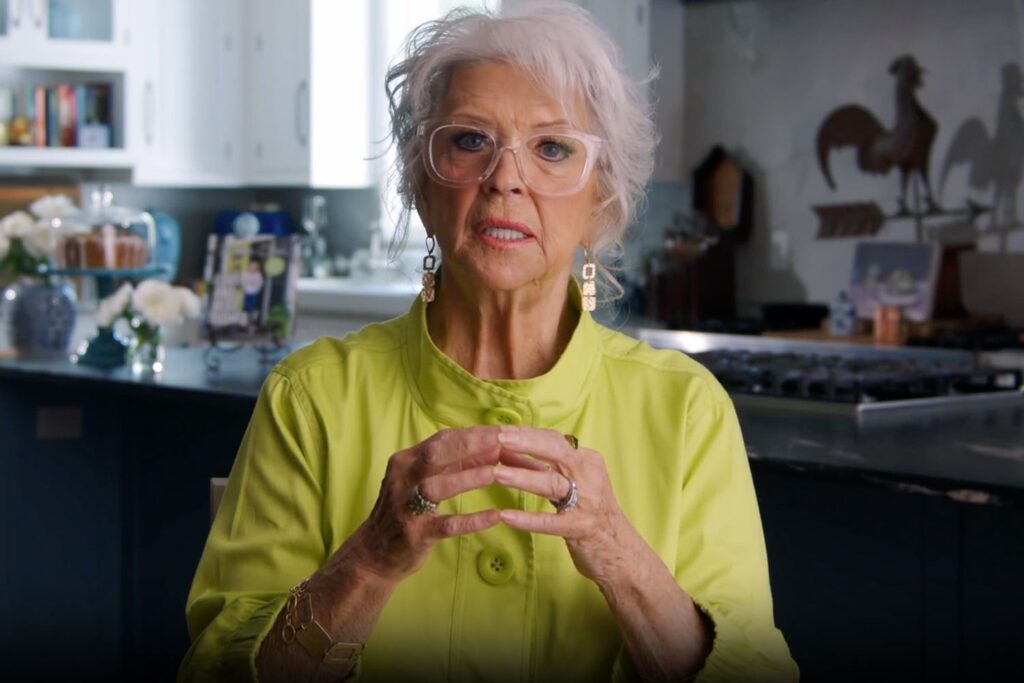NEED TO KNOW
Paula Deen is reflecting on what she’s learned from her racism controversy more than a decade ago.
In Canceled: The Paula Deen Story, which premiered at the Toronto International Film Festival on Sept. 6, the television personality gives her side of the scandal that shattered the culinary star’s multimillion-dollar empire.
“I think I was very gullible because [of] the different races that were entwined in our life,” said Deen, 78, at the PEOPLE/EW and Shutterstock studio at the Toronto International Film Festival, when asked what the experience taught her about race and racism in the United States.
“I was surprised,” she adds.
In the documentary, Deen is seen interacting with a number of Black friends, guests on her show and employees, including her former driver Hollis Johnson, who, in a new interview, defends her against the allegations of racism.
The film’s director, Billy Corben, echoed Deen’s depiction of herself during an interview with PEOPLE.
“There’s a word she uses to describe herself a lot,” Corben said. “It’s only in the doc once or twice, but if you go across her era of stardom, ‘naïve.’ She refers to herself as naïve. I think that’s a very fair and accurate and polite description.”
The documentary chronicles Deen’s journey from the catering business she started with $200 to her 11-year run on the Food Network, which ended when she was fired in 2013 as a result of her admission to using a racial slur in a sworn deposition.
Gareth Cattermole/Getty
The deposition was part of a lawsuit filed by Lisa Jackson, a former manager of one of Paula’s restaurants, Uncle Bubba’s Seafood and Oyster House. Jackson accused Deen’s brother Bubba Hiers, who ran the restaurant, of sexual harassment and using racially offensive language.
A federal judge in Georgia dismissed the lawsuit after a settlement was reached, but the controversy cost Deen numerous business deals.
Jackson issued a statement following the settlement: “The Paula Deen I have known for more than eight years is a woman of compassion and kindness and will never tolerate discrimination or racism of any kind toward anyone.”
In the film, Deen maintains that when she admitted to having used the racial slur, she was referring to a 1987 incident, where she was held at gunpoint while working at a bank. Her friend and former business associate Gordon Elliott explains in the documentary that she used the slur later on when she was talking to her husband about what had happened.
Deen tells PEOPLE why she chose not to deny her use of the slur during her deposition, explaining, “I don’t like liars and I don’t like thieves.”
When asked about what she would’ve done differently, Deen took issue with her legal team at the time of the deposition.
“I regret that I had such an inept attorney because he never opened his mouth,” she says, claiming, “Found out later it was malpractice.”
Celene Tang/Deadline via Getty
In the film, Deen’s current lawyer, Bill Glass, says of her former attorneys, “The lawyers that represented her were all excellent, but when you live and practice in Savannah, and your modus operandi does not include representing superstars and public figures, you can’t be as adept at defending those folks.”
Deen remembers being told, “Paula, it’s easy. Just tell the truth,” and responding, “Well, I can do that.”
The film then cuts to Glass saying, “The rule should be object and stay away from anything off topic that could get your client in trouble.” He adds that Deen’s lawyer at the time should have objected to Deen being asked if she had ever used the N-word, since it was not relevant to the allegations against her brother.
Deen tells PEOPLE she still feels the consequences of the painful chapter that followed the controversy.
“I live that every day,” she says. “When somebody takes your reputation away, that you’ve worked so hard and I’ve been good and kind and fair to everyone, and someone takes that away from you, I can’t think anything of anything else than that.”

